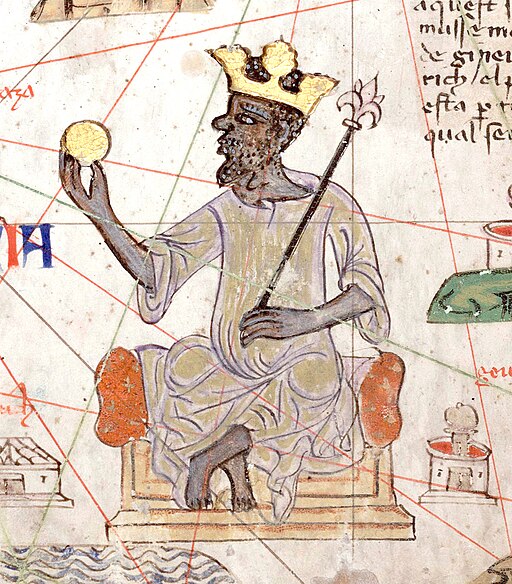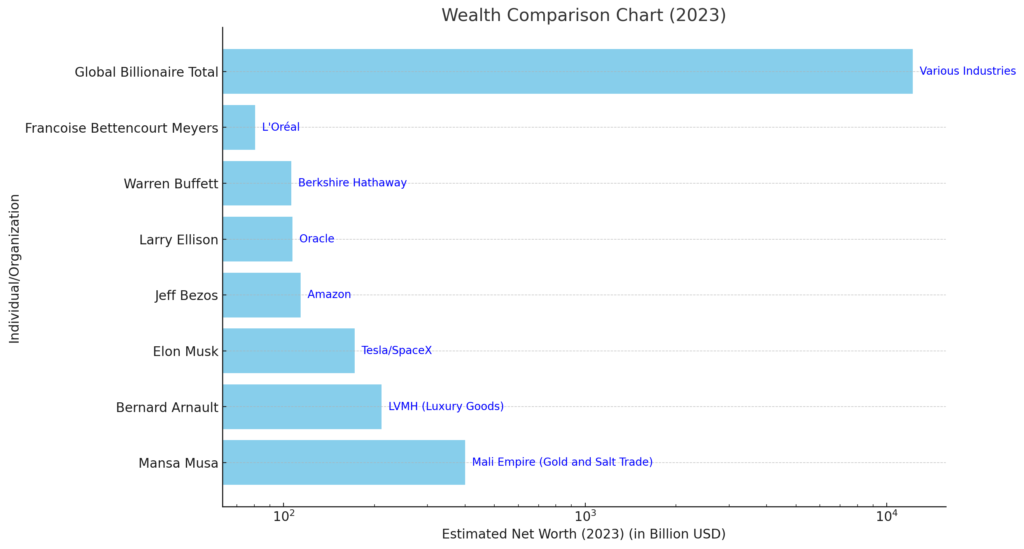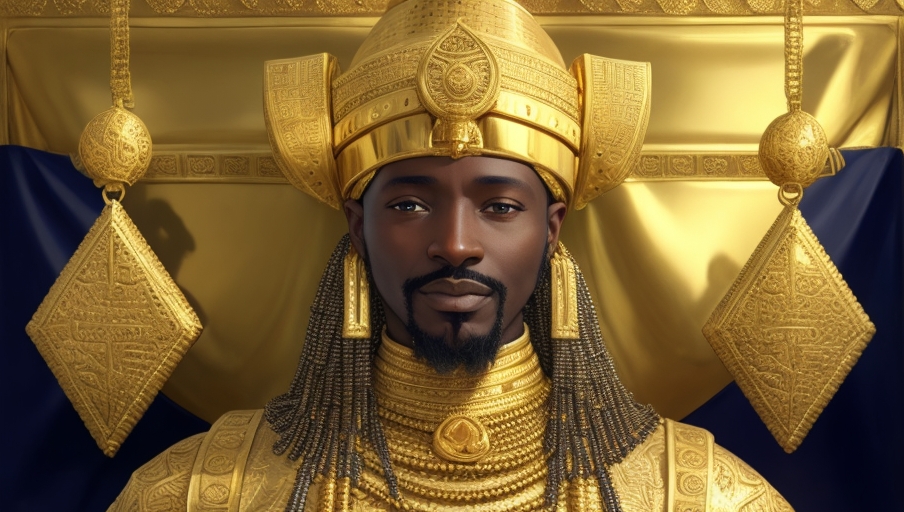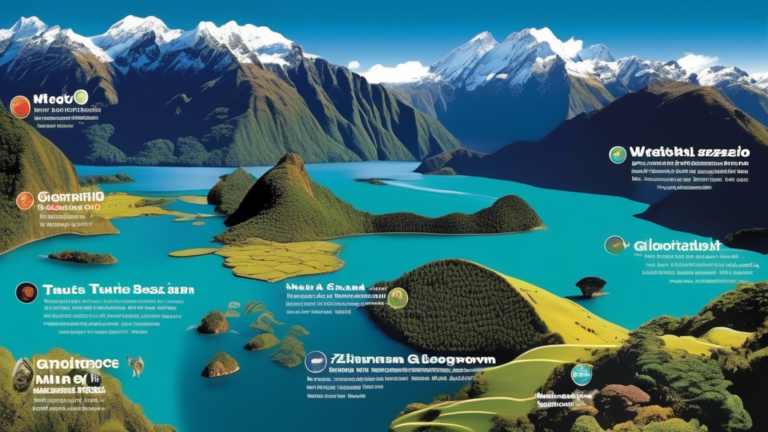Mansa Musa’s Net Worth: Unveiling the Golden Legacy of History’s Wealthiest Ruler
Mansa Musa´s net worth was beyond measure, in our comprehensive guide that delves into his life, reign, and the enduring impact he left on the Mali Empire and the world.
Table of Contents
More about HISTORY
Who was Mansa Musa?

Image : https://en.wikipedia.org/wiki/Mansa_Musa
Mansa Musa, born in the late 13th century, emerged as a figure who would later be synonymous with unimaginable wealth and prosperity. As the tenth ruler of the Mali Empire, he inherited a kingdom rich in natural resources, including vast gold and salt mines. His reign, which spanned from 1312 to 1337, witnessed an era of unprecedented growth and prosperity, turning the Mali Empire into a hub of wealth, culture, and education.
Background and Rise to Power
Mansa Musa’s early life remains shrouded in mystery, with various accounts painting a picture of a visionary leader who was destined for greatness. His ascent to the throne came at a time when the Mali Empire was already flourishing, but it was under his stewardship that it reached its zenith. Mansa Musa expanded the empire’s territories, fostered diplomatic relations, and nurtured a vibrant cultural and economic landscape that attracted scholars and traders from different parts of the world.
The Mali Empire During His Reign
Image: https://en.wikipedia.org/wiki/Mali_Empire
Under Mansa Musa’s rule, the Mali Empire transformed into an epicenter of wealth, learning, and cultural exchange. The empire controlled critical trade routes, facilitating the flow of gold, salt, and other precious commodities, which played a pivotal role in shaping the economy of the region. Mansa Musa’s reign saw the construction of architectural marvels, including grand mosques and learning centers, which stood as a testament to the empire’s grandeur and sophistication. Timbuktu, in particular, blossomed into a renowned center of Islamic learning and culture, attracting intellectuals and scholars from various corners of the Islamic world.
Mansa Musa’s Unprecedented Wealth
In the context of wealth, Mansa Musa’s fortune remains unparalleled, often described as incomprehensible and beyond estimation. His affluence was not just a testament to the abundant natural resources at his disposal but also a reflection of his astute leadership and economic foresight.
Comparison with Modern Billionaires

When we attempt to compare Mansa Musa’s wealth with modern billionaires, the scale of his fortune seems to dwarf even the wealthiest individuals of the 21st century. While contemporary billionaires like Jeff Bezos and Elon Musk have amassed wealth through technology and business ventures, Mansa Musa’s wealth stemmed from the natural riches of his land, coupled with a booming trade network that spanned across continents.
Estimations of His Wealth
Quantifying Mansa Musa’s wealth in modern terms proves to be a Herculean task, as the economic dynamics of his time were vastly different from today. However, historians and economists alike agree that his fortune was so immense that it would potentially eclipse the net worth of today’s billionaires, possibly making him the wealthiest individual in the history of mankind. His legendary pilgrimage to Mecca, where he distributed gold so generously that it caused inflation in the regions he passed, stands as a testament to his unprecedented wealth.
The Life and Reign of Mansa Musa
In the golden chapters of history, Mansa Musa’s reign stands as a beacon of prosperity and grandeur. As we delve deeper, we uncover the layers of his early life, his ascension to the throne, and the golden age that the Mali Empire witnessed under his rule. Let’s embark on this journey through time, where gold was the fabric of an empire, and one man stood at the helm of it all.
Early Life and Ascension to the Throne
Family Background
In the heart of West Africa, amidst the golden sands and vibrant cultures, a young Mansa Musa was born into a lineage of rulers who had already set the stage for a prosperous empire. While much of his early life remains shrouded in mystery, it is believed that he was a nephew of the preceding king, Sundiata Keita, the founder of the Mali Empire. This familial connection paved the way for Mansa Musa to inherit not just a throne, but an empire that was a gold mine, quite literally.
Early Reign and Expansions
As I recount the early days of his reign, I can almost feel the pulsating energy of a young king ready to carve out his legacy. Mansa Musa wasted no time in expanding the boundaries of his empire. With a keen eye for development and a robust military force at his disposal, he annexed several regions, bringing them under the golden wing of the Mali Empire. His leadership style was assertive yet visionary, as he fostered relations with neighboring states, paving the way for a prosperous and peaceful reign.
Golden Age of the Mali Empire
Economic Prosperity
As we step into the golden age of the Mali Empire, we find an economy that was flourishing like never before. Under Mansa Musa’s guidance, the empire became a hub of economic activity, with trade routes buzzing with merchants trading in gold, salt, and other precious commodities. I can almost hear the bustling marketplaces, where gold flowed freely, and prosperity was the order of the day. Mansa Musa nurtured this economic boom with policies that encouraged trade and commerce, turning his empire into a golden paradise that attracted traders from far and wide.
Developments in Trade and Commerce
During this period, the developments in trade and commerce were nothing short of revolutionary. Mansa Musa introduced measures that fostered growth and innovation in various sectors. The empire became a melting pot of cultures, where ideas exchanged and new concepts took root. Trade routes expanded, and the empire became a nexus for commerce, connecting different parts of Africa and even extending to regions beyond the continent.
Under Mansa Musa’s watchful eyes, the Mali Empire transformed into a powerhouse of wealth and innovation. The markets were vibrant, with goods from different lands gracing the stalls. It was a time when art and intellect flourished, giving rise to a culture rich in tradition and knowledge.
The Pilgrimage to Mecca
In the annals of history, few events resonate with the grandeur and magnificence of Mansa Musa’s pilgrimage to Mecca. A journey that not only showcased his devout faith but also displayed the immense wealth and cultural richness of the Mali Empire. Let’s walk through this historic pilgrimage, a journey that left an indelible mark on the sands of time.
The Journey

Image History.com
Preparation and Commencement
As I sit here, I can vividly imagine the day Mansa Musa announced his pilgrimage to Mecca. The entire empire buzzed with anticipation. The preparation was nothing short of a grand spectacle. Mansa Musa mobilized a caravan that was a sight to behold, comprising thousands of people, including officials, soldiers, heralds, entertainers, merchants, and camel drivers, not to mention the substantial amount of gold he carried with him. As the caravan commenced its journey, it seemed like a moving city, a golden river flowing through the desert, marking the beginning of a historic voyage.
Notable Events During the Pilgrimage
During the pilgrimage, several notable events etched themselves in the annals of history. Mansa Musa, with his generous disposition, distributed gold freely to the people he encountered on his journey. In Cairo, his generosity was such that he gave away so much gold that it caused a significant devaluation in the region, an event that economists today refer to as the “Mansa Musa depression”. His interactions with various leaders and scholars during the journey also fostered cultural exchanges and dialogues that enriched the intellectual landscape of the time.
The Impact on the Regions Visited
Economic Implications
As we delve deeper, we find that the economic implications of Mansa Musa’s pilgrimage were profound. His generous distribution of gold not only showcased the wealth of the Mali Empire but also had a significant impact on the economies of the regions he visited. The influx of gold in these regions caused a surge in inflation, a testimony to the unimaginable wealth that Mansa Musa possessed. His journey, thus, became a catalyst for economic changes in the regions he graced with his presence.
Cultural Exchanges and Influences
But the pilgrimage was not just about gold; it was a journey that fostered cultural exchanges and influences that resonate even today. Mansa Musa’s interactions with scholars, leaders, and common folk alike led to a rich exchange of ideas and philosophies. He invited scholars and artists from various regions to Mali, fostering a cultural renaissance that turned the empire into a hub of knowledge and artistic expression. The Mali Empire, under his reign, became a melting pot of cultures, where Islamic scholarship flourished, and architectural marvels rose from the ground, showcasing a blend of Islamic and African influences.
The Economic Impact of Mansa Musa’s Reign
Mansa Musa’s reign marked a golden era in the truest sense, not just in terms of wealth but also in the flourishing trade and commerce that characterized the period. Let’s navigate through the bustling markets and grand infrastructural developments that dotted the landscape of the Mali Empire during this time.
Trade and Commerce
Introduction to the Gold and Salt Trade
As I reminisce about the vibrant trade scene of that era, I can almost smell the scent of spices mingling with the aroma of freshly mined gold and salt. The Mali Empire was at the heart of a bustling trade network, where gold and salt were the primary commodities that fueled economic prosperity. Mansa Musa capitalized on this, fostering a trade environment where merchants could thrive, and wealth circulated abundantly.
Expansion of Trade Routes
During Mansa Musa’s reign, I witnessed a significant expansion of trade routes that connected various parts of Africa and beyond. These routes became veins of commerce, pulsating with life and activity. Mansa Musa ensured the safety and security of these routes, encouraging traders from distant lands to engage in commerce with the Mali Empire. This expansion not only brought in wealth but also facilitated a rich exchange of cultures and ideas, turning the empire into a vibrant mosaic of diverse influences.
Infrastructure and Development
Building Projects
As I recount this golden era, I cannot overlook the grand building projects that Mansa Musa undertook. Under his patronage, the empire saw the rise of architectural marvels that blended Islamic influences with traditional African styles. Grand mosques, palaces, and public buildings adorned the cities, turning them into hubs of beauty and grandeur. Mansa Musa’s vision transformed the landscape of the empire, leaving an indelible mark that still resonates in the ruins and historical sites that bear testimony to his golden reign.
Development of Timbuktu as a Center of Learning
One of the crowning achievements of Mansa Musa’s reign was the transformation of Timbuktu into a renowned center of learning. As I walk through the corridors of time, I can hear the echoes of scholars engaged in fervent discussions, the rustle of parchments, and the vibrant intellectual energy that permeated the city. Mansa Musa invited scholars from various parts of the Islamic world to grace the city with their knowledge. Under his patronage, Timbuktu blossomed into a hub of intellectual and cultural activity, attracting scholars and thinkers from across the globe.
Legacy and Cultural Influence
As the golden sun sets on Mansa Musa’s reign, it leaves behind a legacy that continues to shimmer through centuries, casting long shadows that influence modern discourse and cultural narratives. Let’s traverse through time to understand the enduring impact of this golden era on art, literature, and the modern perception of the Mali Empire.
Mansa Musa in Modern Discourse
Representation in Modern Media
In the modern era, I find Mansa Musa resurfacing in discussions, documentaries, and educational materials, as a figure of awe and inspiration. His life and reign have become subjects of extensive study, capturing the imagination of people around the world. From documentaries that narrate his grand pilgrimage to Mecca to artistic representations that try to encapsulate his grandeur, Mansa Musa continues to be a prominent figure in modern media, inspiring awe and curiosity.
Influence on Art and Literature
As I delve into the world of art and literature, I find Mansa Musa’s influence echoing through the corridors of time. Artists and writers draw inspiration from his life, creating works that reflect the grandeur and prosperity of his reign. His journey, his wealth, and his patronage of arts and education have become rich sources of inspiration, fostering a body of work that celebrates the golden age of the Mali Empire.
The Legacy of the Mali Empire
Cultural and Historical Significance
Mansa Musa’s reign marked a golden chapter in the history of the Mali Empire, a period that witnessed unprecedented growth in trade, education, and cultural exchange. The cultural and historical significance of this era continues to resonate in modern times, as historians and scholars delve deeper to uncover the layers of richness that characterized this period. The Mali Empire, under Mansa Musa, became a beacon of knowledge and prosperity, leaving behind a legacy that continues to inspire and educate.
The Decline of the Mali Empire
But as we navigate through the annals of history, we also encounter the period of decline that followed the golden age. After Mansa Musa’s death, the Mali Empire faced several challenges, including internal strife and external invasions. The once prosperous empire gradually lost its glory, succumbing to the sands of time. Yet, despite its decline, the legacy of the Mali Empire and Mansa Musa’s reign continues to shine, a golden beacon in the vast landscape of history, a testament to a time when wealth, culture, and knowledge flourished in the heart of Africa.
Conclusion
As we stand at the crossroads of time, looking back at the golden path we traversed, we find a life and reign that were nothing short of a golden epic, a tale of wealth, prosperity, and cultural richness that continues to resonate through the sands of time. Let’s recap the monumental life of Mansa Musa and explore the enduring legacy he left behind.
Recap of Mansa Musa’s Life and Reign
In the golden annals of history, Mansa Musa emerges as a figure of unparalleled wealth and grandeur. From his early days as a ruler, where he expanded the boundaries of the Mali Empire, to his historic pilgrimage to Mecca, Mansa Musa’s life is a testament to visionary leadership and prosperity. His reign marked a golden age where trade flourished, knowledge blossomed, and cultural exchanges enriched the lives of his subjects.
The Enduring Legacy of Mansa Musa
As I sit here, recounting the golden legacy of Mansa Musa, I find that his influence transcends time. His patronage of education and the arts fostered a golden age of intellectual and cultural growth, the echoes of which can still be heard in modern discourse. Mansa Musa, through his life and deeds, left an indelible mark on history, a golden legacy that continues to inspire and educate generations.
FAQs
How did Mansa Musa accumulate his wealth?
Mansa Musa amassed his unprecedented wealth primarily through the rich gold and salt mines that dotted the Mali Empire. His strategic control over these lucrative trade routes allowed for a flourishing economy, where wealth circulated abundantly, making him one of the wealthiest individuals in history.
What was the significance of the pilgrimage to Mecca?
The pilgrimage to Mecca, also known as the Hajj, is one of the five pillars of Islam, showcasing Mansa Musa’s deep devotion to his faith. Beyond religious obligations, his pilgrimage also displayed the immense wealth and cultural richness of the Mali Empire, fostering economic and cultural exchanges that left a lasting impact on the regions he visited.
How did Mansa Musa’s reign influence the Mali Empire’s economy?
Under Mansa Musa’s visionary leadership, the Mali Empire witnessed a golden age of economic prosperity. The expansion of trade routes, fostering of commerce, and strategic alliances turned the empire into a bustling hub of economic activity, where wealth and culture flourished side by side.
What are some notable constructions during Mansa Musa’s reign?
During his reign, Mansa Musa commissioned several grand building projects that blended Islamic influences with traditional African styles. Notable constructions include the legendary University of Sankore in Timbuktu, grand mosques, and public buildings that turned cities into hubs of beauty and grandeur.
How is Mansa Musa perceived in modern times?
In modern times, Mansa Musa is revered as a symbol of African wealth, prosperity, and cultural richness. His life and reign have become subjects of extensive study, inspiring a body of work that celebrates the golden age of the Mali Empire, fostering a renewed interest in African history and its rich cultural tapestry.
As we close this golden chapter, we find ourselves enriched with the knowledge of a time when gold was the fabric of an empire, and one man stood at the helm of it all, steering it to heights of unprecedented prosperity and cultural richness. Thank you for joining me on this journey through time, exploring the golden legacy of Mansa Musa, a ruler whose wealth knew no bounds, and whose reign left an everlasting imprint on the sands of time.




